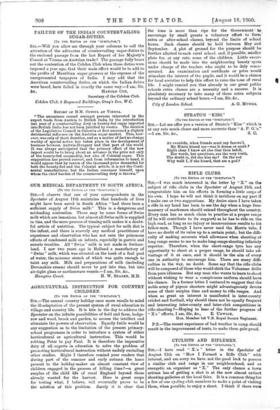FAILURE OF THE INDIAN COUNTERVAILING SUGAR-DUTIES.
[To THE EDITOR OF. THE "SPECTATOR."]
Snz,—Will you allow me through your columns to call the attention of the advocates of countervailing sugar-duties to the enclosed passage from the last Report of her Majesty's Consul at Vienna on Austrian trade ? The passage fully bears out the contention of the Cobden Club when these duties were imposed a year ago, that their main effect would be to add to the profits of Mauritian sugar-groyvers at the expense of the unrepresented taxpayers of India. I may add that the American countervailing duties, on which the Indian duties were based, have failed in exactly the same way.—I am, Sir,
Secretary of the Cobden Club.
Cobden Club, 6 Raymond Buildings, Gray's Inn, W.C.
REPORT OF H.M. CONSUL AT VIENNA.
" The uneasiness caused amongst persons interested in the export trade from Austria to British India by the introduction last year of a countervailing duty on bounty-fed sugar imported into British India has not been justified by events. The decision of the Legislative Council in Calcutta at first exercised a slightly detrimental influence on the Austrian sugar market. This, how- ever, was only of short duration, and as a matter of fact no change worthy of special notice has taken place in the development of business between Austria-Hungary and that part of the world. It was always anticipated that the primary effect of the new impost would be to bring about an advance in the price not only of the bounty-fed commodity, but also of Colonial sugar. This supposition has proved correct, and from information to hand, it would appear that by reason of the increased price demanded for both the bounty-fed and the Colonial article, it is not the Conti- nental manufacturer, but the Indian consumer himself, upon whom the chief burden of the countervailing duty is thrown."


































 Previous page
Previous page